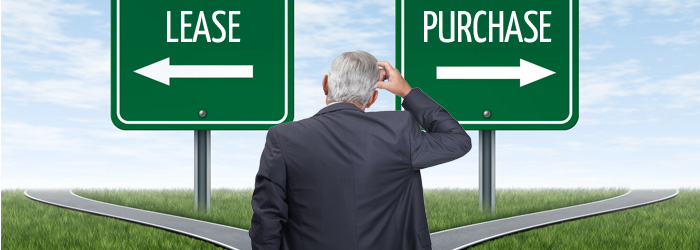When the size or circumstances of your business change there are many questions you’ll face—and among the most important is a determination of whether a lease or purchase of commercial real estate is in your best long-term interest.
While each company’s unique qualities — as determined by an almost infinite number of potential variables — preclude any universally correct, “black or white” answer to this question without substantial analysis, there are a few common factors that should be considered when determining whether to continue leasing or to purchase space. These include:
- Cash investment considerations
- Type of business
- Time the business is expected to operate
- Tax implications
- Market cycles and trends
Completing financial, market, and business analyses will help illustrate the strengths and weaknesses of each strategy and provide increased clarity and the decision-making process unfolds. The five areas that need to be included in these studies are addressed in a little more detail below.
Opportunity Costs
A financial analysis may begin with determining the cost of borrowing (it’s more than just the interest rate) and shift to additional cash investment considerations; namely, does a down payment represent the best use of capital, or would another investment provide a better return? Down payments on owner-occupied commercial real estate are subject to a wide range, from 9% to 40% of purchase price, depending on the loan product. The company’s financial statements, personal credit, and property location may impact the equity required. For many, the key question is, “given the current state of the market, would the cash used for a down payment offer better return if invested elsewhere?”
Other expenses and considerations related to purchasing commercial real estate may include:
- Upfit Costs (what alterations are necessary for your business)
- Maintenance and repairs
- Taxes (real estate, special assessments)
- Insurance (the shift from liability to liability and hazard insurance)
Commercial real estate for lease typically requires less investment up front; generally, initial lease costs may include:
- First month lease payment and security deposit
- Upfit Costs
- Future Expansion or Relocation Expense
- Common Area Maintenance (CAM) fees
However, over time, lease costs may incorporate improvements above and beyond the property owner’s contribution, as well as building operating expenses, property taxes, and rent increases. The uncertainty inherent in these variable costs can hinder long-term planning. In contrast, the fixed costs associated with purchasing can offer more certainty. As it stands now, the cost of ownership in Harrisonburg on a monthly basis is substantially lower than the cost of leasing. Of course, this can change quickly in the event of a major repair or needed capital improvement.
Business Type and Projected Length of Operation
In Harrisonburg, and most other markets, the type of business and its projected length of operation both affect the decision to purchase or lease. Many times, the decision to purchase is made based on business stability and investment preferences. If a business plans on operating with a long time horizon, anticipates limited expansion or contraction, and is affected minimally by shifts in consumer traffic (it is a business-to-business operation or is a destination in itself) – purchasing may make more sense. Examples fitting this definition may include industrial users such as light manufacturers or distribution facilities, medical offices, or special use properties. Of course, strong arguments can be made for these businesses to lease rather than purchase, which only underscores the importance of tailored analysis.
On the other hand, a retail-based business that’s influenced by traffic in and around neighboring businesses – an office based operator that requires flexibility and liquidity in case of growth or downsizing – and restaurants that need to maintain capital for operations may want to consider commercial real estate for lease. In fact, most major restaurants, retailers, and office users such as banks do not own the real estate they occupy, but rather choose to control the real estate through a lease. (Want to know more, read “The Capital Under Your Feet”).
Implications for Taxes
Though tax laws and regulations can – and often do — change, purchasing and leasing have different tax implications. For instance, lease payments are often fully deductible, while commercial property owners usually claim depreciation on their building while deducting interest payments. A conversation with your accounting professional is a wise idea as you delve deeper into the decision-making process.
Market Conditions and Trends
The lease vs. purchase dilemma is further complicated by market conditions and trends. Like all other markets, the property market in the Harrisonburg area expands, contracts, recedes, and recovers in reaction to the economic, social, technological, and demographic factors at any given point in time. These trends are influenced by several factors, including:
- Demand/ Vacancy
- Supply/ New Construction
- Rental rates/ Concessions
- Cap rates/Investor interest
- Financing availability
Interactions between these elements determine where the market cycle falls, as well as how business owners are positioned in relation to the market. Analysis takes these factors into consideration, determining the advantages and disadvantages of both purchasing and leasing. Commercial real estate professionals can create a 10-year forecast for Harrisonburg properties, utilizing statistical modeling, historical trends, and market cycle research.
In today’s rapidly changing market, accurate analysis is more important than ever. While asking prices for commercial properties have dropped more than lease prices since 2008, both, seemingly, have stopped declining and concessions are drying up.
It has been suggested that guesswork does not have to be good enough. Professional analysis can help business owners decide which option best meets their needs in the lease versus purchase debate. A commercial real estate professional can provide market data, analysis tools, and experience to help tailor a strategy and recommendation that best fits your business goals allowing a decision to be based on objective research.
You May Also Be Interested In–
- Commercial Real Estate Market Reports | Local Information, Local Report, Updated Quarterly
- Resource Center | White Papers, Commercial Real Estate Tips, and Investment Information
- Search for Property | Search for Commercial Real Estate Throughout the Valley.
- About Tim Reamer | Your Position Will Always Be Informed and Well Represented
 Tim Reamer provides commercial real estate brokerage and consulting services specializing in investment property (multifamily | commercial | NNN), retail/restaurant site selection, and general commercial representation.
Tim Reamer provides commercial real estate brokerage and consulting services specializing in investment property (multifamily | commercial | NNN), retail/restaurant site selection, and general commercial representation.
